| Pages:
1
2
3
4
5
..
15 |
Texium
Administrator
       
Posts: 4665
Registered: 11-1-2014
Location: Salt Lake City
Member Is Offline
Mood: Preparing to defend myself (academically)
|
|
Quote: Originally posted by Daffodile  | Anyone on here ever thought about making some Xylyl Bromide? Found some Sodium Bromide solution at the store the other day, when I ran Chlorine
through it I got some nice dark droplets of Bromine. I destroyed that sample obviously but am considering making some Xylyl Bromide by just mixing
Xylene/ Bromine in reflux and irradiating (patent says a lamp should be sufficient).
I know that there will be a couple brain cells lost in the experiment but it seems like a pretty interesting chemical overall. I've made and tested a
couple other similar chemicals before and had a lot of fun, like chloropicrin or iodoacetone. |
Doesn't seem
worth it to me since you'll be using mixed xylene isomers. You'll also get varying levels of substitution so you'll end up with a whole witch's brew
of partially brominated xylene isomers...
|
|
|
mayko
International Hazard
    
Posts: 1218
Registered: 17-1-2013
Location: Carrboro, NC
Member Is Offline
Mood: anomalous (Euclid class)
|
|
Doing my first fractional distillation (of the crude formic acid). Water coming over right now ~101C!
al-khemie is not a terrorist organization
"Chemicals, chemicals... I need chemicals!" - George Hayduke
"Wubbalubba dub-dub!" - Rick Sanchez
|
|
|
Eddygp
National Hazard
   
Posts: 858
Registered: 31-3-2012
Location: University of York, UK
Member Is Offline
Mood: Organometallic
|
|
Cracking some dicyclopentadiene from a very old bottle... it decided to stop halfway through so who knows what kind of contaminants/degradation
products there are in that starting material (yield~35% maybe?). Hours fighting with the equipment to heat up sufficiently and then that letdown, kind
of a bad day in labs today.
there may be bugs in gfind
[ˌɛdidʒiˈpiː] IPA pronunciation for my Username |
|
|
JJay
International Hazard
    
Posts: 3440
Registered: 15-10-2015
Member Is Offline
|
|
I started building a new fume hood. Also, I dried some molecular sieves.
|
|
|
weilawei
Hazard to Others
  
Posts: 130
Registered: 3-12-2017
Member Is Offline
Mood: No Mood
|
|
Quick and dirty neutralization of NaOH with acetic acid to produce sodium acetate. This will be dried to the anhydrous form in an oven at 149°C for 2
hours with stirring at 30 minute intervals (works beautifully, without decomposition), then recrystallized from a supersaturated solution with a seed
crystal (highly entertaining to watch!).
I have pictures of the last time I recrystallized sdium acetate, though the solution was brown from decomposition products (while I was still
nailing down the procedure). I burnt it the first time. It wasn't pretty, and scraping your product off the bench is no fun. That's after
dissolving a brick of charcoal acetate  and cleaning it up with activated charcoal
and repeated filtration. and cleaning it up with activated charcoal
and repeated filtration.
Note the condensation on the beaker rim. The solution was initially cooled to room temperature very slowly, and that condensation is entirely from the
water vapor driven off by the exothermic crystallization of the sodium acetate which started only seconds before the photo and almost instantly
crystallized the entire solution. The second photo is after filtering, washing, and drying on the pump.
CH3COONa•3H2O
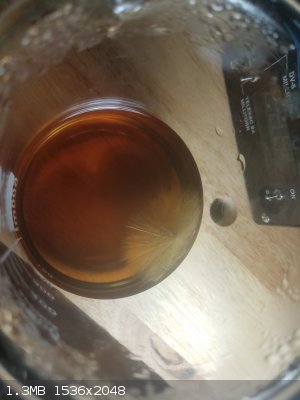
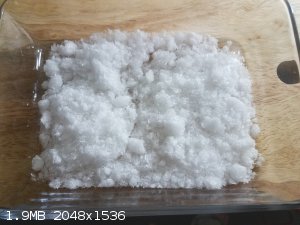
[Edited on 12-10-2018 by weilawei]
|
|
|
nimgoldman
Hazard to Others
  
Posts: 304
Registered: 11-6-2018
Member Is Offline
|
|
My first alkyl halide - bromoethane, fractionally distilled between 38.4-38.7 °C
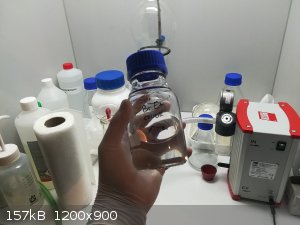
|
|
|
mayko
International Hazard
    
Posts: 1218
Registered: 17-1-2013
Location: Carrboro, NC
Member Is Offline
Mood: anomalous (Euclid class)
|
|
got some nice copper formate crystals cropping up, clusters of flakes though I want to reheat & concentrate the solution some more.
al-khemie is not a terrorist organization
"Chemicals, chemicals... I need chemicals!" - George Hayduke
"Wubbalubba dub-dub!" - Rick Sanchez
|
|
|
Jackson
Hazard to Others
  
Posts: 189
Registered: 22-5-2018
Location: U S of A
Member Is Offline
Mood:  Happy about new glassware 
|
|
Just did some tests on a sample that I made of what I though to be sodium tungstate only to find out that my tungsten I used is probably zinc and my
sample is Zinc Sulfate.
|
|
|
fusso
International Hazard
    
Posts: 1922
Registered: 23-6-2017
Location: 4 ∥ universes ahead of you
Member Is Offline
|
|
Quote: Originally posted by Jackson  | | Just did some tests on a sample that I made of what I though to be sodium tungstate only to find out that my tungsten I used is probably zinc and my
sample is Zinc Sulfate. |
Obviously you should have researched a bit to know that H2SO4 isn't needed to
dissolve W.
|
|
|
Jackson
Hazard to Others
  
Posts: 189
Registered: 22-5-2018
Location: U S of A
Member Is Offline
Mood:  Happy about new glassware 
|
|
Quote: Originally posted by fusso  | Quote: Originally posted by Jackson  | | Just did some tests on a sample that I made of what I though to be sodium tungstate only to find out that my tungsten I used is probably zinc and my
sample is Zinc Sulfate. |
Obviously you should have researched a bit to know that H2SO4 isn't needed to
dissolve W. |
I used Sulfuric and H2O2 to speed it up. I understood that sulfuric is not needed but I assumed turning it into Caro’s Acid could act as a better
oxidizer than just H2O2
|
|
|
JJay
International Hazard
    
Posts: 3440
Registered: 15-10-2015
Member Is Offline
|
|
I made some nitric acid out of a sulfuric acid solution that had been sitting around for almost a month waiting to be made into nitric acid. I also
did a third recrystallization of some sodium carbonate, which is currently drying in an oven. Hopefully sometime next week I'll get to titrate my
stocks of nitric acid. I also want to make some glacial acetic acid and see if I can get it to 99.9%+, and I plan to research chrome plating and
finish my fume hood.
|
|
|
nimgoldman
Hazard to Others
  
Posts: 304
Registered: 11-6-2018
Member Is Offline
|
|
Just synthesized tetrahydroharmine (leptaflorine) from harmaline via reduction in zinc-acetic acid.
The tetrahydroharmine (two larger beakers) glows with faint blue color compared to harmine that glows green in UV. This confirms the transformation
has taken place.
Next time I will do the synthesis without allowing oxygen to form side products.

|
|
|
Ubya
International Hazard
    
Posts: 1247
Registered: 23-11-2017
Location: Rome-Italy
Member Is Offline
Mood: I'm a maddo scientisto!!!
|
|
today is lab day!!! (after a week of running to and from university)
this morning i put together and tested my chinese H01-2 oxy-acetylene torch using a disposable oxygen bottle and butane (from a dismantled blowtorch),
melted an iron nail and some refrigeration copper tubing withoutany problems, i should use the proper gas tubing and flash arrestors, maybe next
time
then i added to my diy fumehood water lines for my distillations (still need to work on the cooling system)
and last i evaporated some purified ZnSO4 solution i made 2 years ago from H2SO4 and zinc from batteries and left sitting on the bench for all this
time, i wanted to make doped ZnS glow in the dark powder (and maybe doping it with Ag to make it fluoresce when hit by alfa or beta radiation)
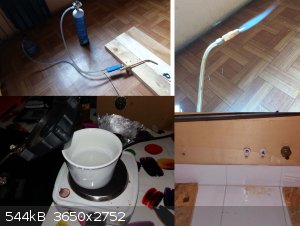
---------------------------------------------------------------------
feel free to correct my grammar, or any mistakes i make
---------------------------------------------------------------------
|
|
|
JJay
International Hazard
    
Posts: 3440
Registered: 15-10-2015
Member Is Offline
|
|
Today I calibrated my thermometers and found that my mercury thermometer is accurate at around freezing but several degrees off at the boiling point
of water. My alcohol thermometer is several degrees off at around freezing but accurate at the boiling point of water (last time I checked, it was
accurate at freezing and read several degrees too high at the boiling point of water). I guess I should check my thermocouples....
Edit: my PID controller is dead on at 0.0 C and also dead on at 99.9 C. Cool.
[Edited on 5-11-2018 by JJay]
|
|
|
Sulaiman
International Hazard
    
Posts: 3779
Registered: 8-2-2015
Member Is Offline
|
|
Quote: Originally posted by JJay  | Today I calibrated my thermometers and found that my mercury thermometer is accurate at around freezing but several degrees off at the boiling point
of water. My alcohol thermometer is several degrees off at around freezing but accurate at the boiling point of water (last time I checked, it was
accurate at freezing and read several degrees too high at the boiling point of water). I guess I should check my thermocouples....
Edit: my PID controller is dead on at 0.0 C and also dead on at 99.9 C. Cool.
[Edited on 5-11-2018 by JJay] |
did you use distilled water for the melting ice and boiling water references ?
and compensate for your local atmospheric pressure ?
I ask because I've not encountered a thermometer that is accurate at 0oC but not at 100oC,
and in a U2U I recently told a newer member that this is highly unlikely,
so I'd like to clear this issue in my mind.
Has anyone else found an unbroken liquid filled thermometer that is in calibration at 0oC but not at 100oC ?
[Edited on 5-11-2018 by Sulaiman]
|
|
|
JJay
International Hazard
    
Posts: 3440
Registered: 15-10-2015
Member Is Offline
|
|
I knew for a fact that the alcohol thermometer was low quality and gave inaccurate temperature readings, but it was something like $1.20 with free
shipping. The mercury thermometer came from a reputable supplier and was expensive, but it had given what I felt was an anomalously low reading last
time I used it.
I compensated for local atmospheric pressure (otherwise 99.9 C would not be "dead on"). I did not use distilled water, but the water had a low mineral
content, so the melting point depression and boiling point elevation would be insignificant. Also, in this case, one thermometer is accurate at around
0 C and the other is accurate at around 100 C, yet they both read too low at the other extremes; dissolved minerals can't cause that scenario.
Any calibration procedure for a thermometer will tell you to take multiple readings. They don't all say to use distilled water. (For example: https://www.epicurious.com/expert-advice/how-to-calibrate-a-...) In some places, calibration wtih distilled water would be necessary.
Taking only one temperature reading for calibration is bad practice.
|
|
|
JJay
International Hazard
    
Posts: 3440
Registered: 15-10-2015
Member Is Offline
|
|
Chloroform Production Optimization, part 1
4 gallon jugs containing 3785 mL of 6% store brand bleach were purchased and chilled to 5 C. For each jug of bleach, the following procedure was
performed:
1. Remove 85 mL of bleach from the jug.
2. Add a measured quantity of solvent-grade acetone.
3. Tightly cap and shake, then loosen the cap and chill in refrigerator for 2 h.
Each jug was capped and shaken one additional time, after which the cap was loosened and the mixture was allowed to chill for 6 h. The organic and
aqueous layers were separated, and the following yields of crude chloroform were obtained from the corresponding quantities of acetone:
A. 80.9 mL acetone => 54 mL chloroform (10% excess of acetone)
B. 73.5 mL acetone => 53 mL chloroform (stoichiometric quantities)
C. 66.2 mL acetone => 49 mL chloroform (10% excess of hypochlorite)
D. 58.8 mL acetone => 43 mL chloroform (20% excess of hypochlorite)
It appears that there is no advantage to using an excess of hypochlorite. The advantage of using an excess of acetone is not really evident from this
experiment since the purity of the products is not known.
[Edited on 12-11-2018 by JJay]
|
|
|
Sulaiman
International Hazard
    
Posts: 3779
Registered: 8-2-2015
Member Is Offline
|
|
As I am unlikely to achieve exact stoichiometry in most similar experiments
so I usually decide in advance which reactant will be in (slight) excess,
often it is just the cheapest reactant,
sometimes it is to make separation of product easier.
so
in this case I would use a slight excess of bleach to ensure that all of the acetone is used.
- because I probably would not initially bother with an accurate titration of the bleach 
|
|
|
JJay
International Hazard
    
Posts: 3440
Registered: 15-10-2015
Member Is Offline
|
|
My purification procedure removes excess acetone. I'm planning on making a liter or so of chloroform, so I'd like to have an optimized process.
|
|
|
Sulaiman
International Hazard
    
Posts: 3779
Registered: 8-2-2015
Member Is Offline
|
|
I made chloroform using a cheap dilute domestic bleach which gave a little product,
as chloroform is about 1% miscible in water I wanted to reduce the starting water content,
so I thought " why not use my 15% sodium hypochlorite solution ? "
... quite energetic 
So too dilute needs distillation to recover all of the chloroform
and too concentrated needs unobtainable cooling.
that's all I know.
|
|
|
DavidJR
National Hazard
   
Posts: 908
Registered: 1-1-2018
Location: Scotland
Member Is Offline
Mood: Tired
|
|
Quote: Originally posted by Sulaiman  | I made chloroform using a cheap dilute domestic bleach which gave a little product,
as chloroform is about 1% miscible in water I wanted to reduce the starting water content,
so I thought " why not use my 15% sodium hypochlorite solution ? "
... quite energetic 
So too dilute needs distillation to recover all of the chloroform
and too concentrated needs unobtainable cooling.
that's all I know.
|
I tried using the dirt cheap tesco bleach (3% NaOCl if I recall correctly) and didn't get a high enough product concentration for it to separate out
at all.
Even using 14% there's still a lot of water to get rid of for fairly little product.
However I have no motivation to make any more since I've ordered 1L for far less than it would cost me to make.
|
|
|
morganbw
National Hazard
   
Posts: 561
Registered: 23-11-2014
Member Is Offline
Mood: No Mood
|
|
Quote: Originally posted by DavidJR  | Quote: Originally posted by Sulaiman  | I made chloroform using a cheap dilute domestic bleach which gave a little product,
as chloroform is about 1% miscible in water I wanted to reduce the starting water content,
so I thought " why not use my 15% sodium hypochlorite solution ? "
... quite energetic 
So too dilute needs distillation to recover all of the chloroform
and too concentrated needs unobtainable cooling.
that's all I know.
|
I tried using the dirt cheap tesco bleach (3% NaOCl if I recall correctly) and didn't get a high enough product concentration for it to separate out
at all.
Even using 14% there's still a lot of water to get rid of for fairly little product.
However I have no motivation to make any more since I've ordered 1L for far less than it would cost me to make. |
Some wisdom there. There really seems a balance is required and this is not chloroform specific.
[Edited on 11/12/2018 by morganbw]
|
|
|
JJay
International Hazard
    
Posts: 3440
Registered: 15-10-2015
Member Is Offline
|
|
Quote: Originally posted by Sulaiman  | I made chloroform using a cheap dilute domestic bleach which gave a little product,
as chloroform is about 1% miscible in water I wanted to reduce the starting water content,
so I thought " why not use my 15% sodium hypochlorite solution ? "
... quite energetic 
So too dilute needs distillation to recover all of the chloroform
and too concentrated needs unobtainable cooling.
that's all I know.
|
The usual trick for conducting highly exothermic reactions in a controlled manner is to avoid mixing all of the reactants together at once. In this
case, you could add the acetone in small portions with cooling in between.
|
|
|
Ubya
International Hazard
    
Posts: 1247
Registered: 23-11-2017
Location: Rome-Italy
Member Is Offline
Mood: I'm a maddo scientisto!!!
|
|
hoping to get a few ml of limonene from 530g of orange peels
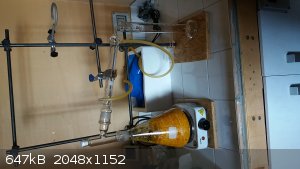
---------------------------------------------------------------------
feel free to correct my grammar, or any mistakes i make
---------------------------------------------------------------------
|
|
|
Sulaiman
International Hazard
    
Posts: 3779
Registered: 8-2-2015
Member Is Offline
|
|
If successful to any degree, or even if you realise why it was not,
then please report with some notes as this and similar are on my list.
CAUTION : Hobby Chemist, not Professional or even Amateur
|
|
|
| Pages:
1
2
3
4
5
..
15 |